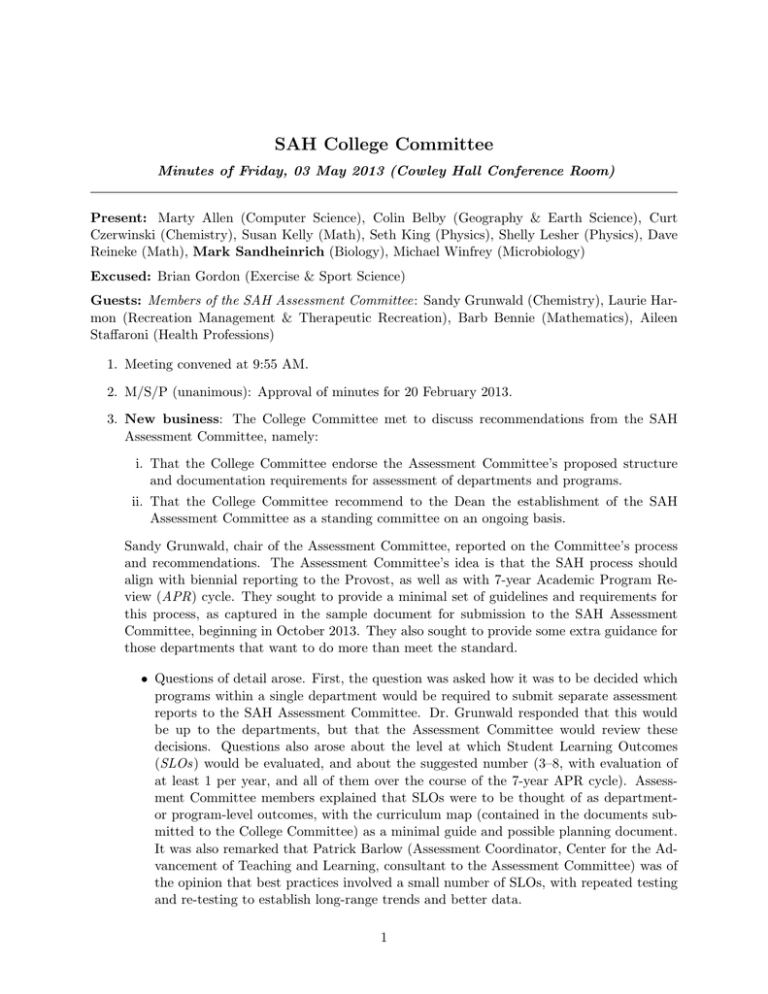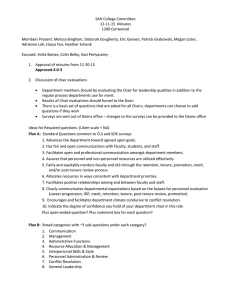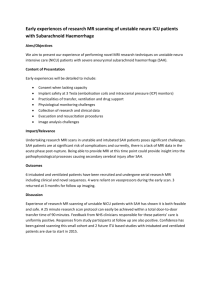SAH College Committee
advertisement

SAH College Committee Minutes of Friday, 03 May 2013 (Cowley Hall Conference Room) Present: Marty Allen (Computer Science), Colin Belby (Geography & Earth Science), Curt Czerwinski (Chemistry), Susan Kelly (Math), Seth King (Physics), Shelly Lesher (Physics), Dave Reineke (Math), Mark Sandheinrich (Biology), Michael Winfrey (Microbiology) Excused: Brian Gordon (Exercise & Sport Science) Guests: Members of the SAH Assessment Committee: Sandy Grunwald (Chemistry), Laurie Harmon (Recreation Management & Therapeutic Recreation), Barb Bennie (Mathematics), Aileen Staffaroni (Health Professions) 1. Meeting convened at 9:55 AM. 2. M/S/P (unanimous): Approval of minutes for 20 February 2013. 3. New business: The College Committee met to discuss recommendations from the SAH Assessment Committee, namely: i. That the College Committee endorse the Assessment Committee’s proposed structure and documentation requirements for assessment of departments and programs. ii. That the College Committee recommend to the Dean the establishment of the SAH Assessment Committee as a standing committee on an ongoing basis. Sandy Grunwald, chair of the Assessment Committee, reported on the Committee’s process and recommendations. The Assessment Committee’s idea is that the SAH process should align with biennial reporting to the Provost, as well as with 7-year Academic Program Review (APR) cycle. They sought to provide a minimal set of guidelines and requirements for this process, as captured in the sample document for submission to the SAH Assessment Committee, beginning in October 2013. They also sought to provide some extra guidance for those departments that want to do more than meet the standard. • Questions of detail arose. First, the question was asked how it was to be decided which programs within a single department would be required to submit separate assessment reports to the SAH Assessment Committee. Dr. Grunwald responded that this would be up to the departments, but that the Assessment Committee would review these decisions. Questions also arose about the level at which Student Learning Outcomes (SLOs) would be evaluated, and about the suggested number (3–8, with evaluation of at least 1 per year, and all of them over the course of the 7-year APR cycle). Assessment Committee members explained that SLOs were to be thought of as departmentor program-level outcomes, with the curriculum map (contained in the documents submitted to the College Committee) as a minimal guide and possible planning document. It was also remarked that Patrick Barlow (Assessment Coordinator, Center for the Advancement of Teaching and Learning, consultant to the Assessment Committee) was of the opinion that best practices involved a small number of SLOs, with repeated testing and re-testing to establish long-range trends and better data. 1 • Discussion also centered around possible resistance to the process, as being too onerous, coming as it does on top of the current requirements. The question was raised as to the penalty for failing to follow the process, with some College Committee members recounting anecdotal evidence that failure to do proper assessment in, for instance, the General Education program, generally goes unchecked. Dr. Grunwald replied that this would be up to the Dean, and that this sort of reporting might also be something that the Provost’s office might be involved with, especially as it affects accreditation efforts. • The question was raised whether the Assessment Committee, if established on a standing basis, would be able to provide guidance to departments about the sorts of activities and assessment tools that would be satisfactory, in advance of the submission of reports to that Committee, or in documents like the APR or biennial reports. Dr. Grunwald and other Assessment Committee members replied that while they had not had time yet to establish clearer guidelines, it was hoped that in future such guidance could be provided. 4. The College Committee determined that more time was required to consider the second recommendation concerning the process and guidelines for SAH assessment, and to discuss them with home departments, particular as the future of the Assessment Committee was still uncertain. It was determined that the College Committee would meet again in one week to discuss the issue further. 5. M/S/P (1 abstention, remainder unanimous): That the SAH Assessment Committee’s recommendation, that said Committee be established on a standing basis, be sent to Dean Riley, with the added recommendation that membership consist of one individual elected from each Department in CSAH. 6. Meeting adjourned at 10:45 AM. Respectfully submitted, Marty Allen 2

